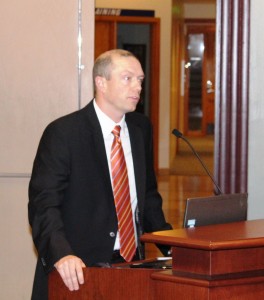Short-Term Actions:
Alcohol Impact Area(s)– designate area(s) within the City in which the sale of high alcohol content, inexpensive single-serving take out products is prohibited.
Amend the aggressive begging ordinance to prohibit panhandling at intersections and on median strips without changing the associated penalty for these offenses.
Increase law enforcement presence in the commercial core areas (especially bike and foot patrols), and incorporate outreach to street populations into police and EMS services.
Embed a social worker in EMS and police teams. Explore the use of qualified non-commissioned personnel if there are insufficient commissioned officers to implement this recommendation.
Develop a multi-agency team of emergency medical, police, jail and hospital personnel to respond to frequent utilizers (identified in consultation with business and property owners) with individually tailored plans to improve functioning of such individuals and reduce the burden on these systems.
Jail Transition Services Facility:
Support the County’s current proposal to convert the Carnegie Building, adjacent to the Jail, into a jail transition facility with services, caseworkers and temporary shelter for individuals released from Jail so they are not released onto the streets without resources.
Expand use of therapeutic courts:
Expand the City’s existing Community Justice Alternatives program to include a drug court, and explore the feasibility of a homeless court and community court.
Adjust jail release time from midnight to a reasonable hour when complimentary services are open.
Ensure released inmates and other dislocated individuals (for example, those released from emergency rooms or other facilities) are returned to their place of origin or where relational support is present.
Implement best practices at meal programs. These include providing indoor waiting and serving areas, monitored restroom facilities and pro-active clean-up of neighboring areas, and engaging individuals served in the operation of the meal program where possible. Faith based communities should be convened twice a year for best practices training. Those offering meal programs should coordinate times and locations to best serve needs throughout the community.
Map resources available in Everett for people experiencing homelessness and others in need (time of day, type, location) so service providers, governments, and the community have a clearer picture of what is going on, where. This can also be used to help get information to those in need.
Short-and Long-Term Strategies: begin now—but expect this to take longer than 2 years to fully implement
Increase capacity of, and access to, drop-in day centers in the City, by expanding hours, exploring the creation of additional centers and where possible expanding services and amenities available at day centers.
Expand countywide capacity to effectively serve the specialized treatment needs of homeless populations, including the creation of additional triage bed capacity, medical detox treatment beds for youth and the construction of an additional detox facility in South Snohomish County.
Provide more shelter bed capacity to serve a range of populations in need.
Expand use of “Housing First” Model to provide “low barrier” housing for chronically homeless individuals, after which they can begin to get treatment. Given that new housing is expensive to develop under traditional approaches,
explore efforts to develop low-cost and non-traditional housing options–with attached services–such as shared housing, shipping container housing and subsidized micro-housing.
Replicate the successful housing levy model implemented in Seattle and Bellingham (either an Everett levy or a countywide levy) to accomplish a coordinated set of housing projects addressing community priorities.
Leverage local funding by advocating for an increased allocation of State Housing Trust Fund dollars for in-City projects. Everett and Snohomish County must work with other cities and public agencies throughout the County to encourage them to address issues of homelessness in their own communities so there is less pressure on Everett’s resources.
The City, County, service providers, and business community should join forces to advocate for additional state, federal and private funding resources to help address the City’s street level social issues. Treatment dollars, capital dollars, outreach dollars: all are needed.
[ad#Google 4]
.






November 20, 2014
Everett, Everett Government